|
William R. Huckle, Editor
|
Join 280 of your colleagues who have already registered!
Vascular Biology 2020
An exciting virtual event
October 26-29, 2020
|

Boston, MA
Postponed until Summer 2021
|
Vascular Biology Publications Alert Now Available by Subscription
The NAVBO Vascular Biology Publications Alert will now be available to non-members for a $55 a year subscription. If you would like to receive this alert, but are not a member, please contact Danielle at membership@navbo.org.
|
Shop at Amazon?
Help Support NAVBO
|
|
Partner Network Advantage on the NAVBO Job Board
|
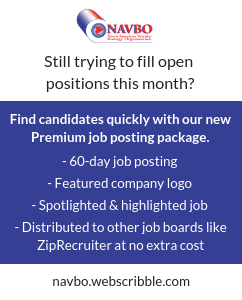
Why post your job on NAVBO's career center rather than going directly to the larger job networks?
Pricing on the mass job boards can vary, but to get a job noticed you typically have to sponsor it for $5 - $10 per day, which can add up quickly especially since you also pay for each click the job gets. When you add it all together, you could be spending up to $45 per day on your job posting. But, when posting a job on NAVBO's career center, you simply pay a flat fee! The Premium package includes our Exclusive Extended Partner Network - which means the jobs are broadcast to sites like ZipRecruiter and Jobs2Careers and more for a flat fee.
With special member pricing, you can post a job for as low as $300 with this Partner Network. You never pay for each click, just the flat fee on the NAVBO career center. In addition, the Premium package includes a 60-day job posting making it a great value. The Premium packages also offer features like having your company's logo featured on the career center homepage, having your job appear first in search results, and more.
|
Your data privacy and security are important to NAVBO. To that end, we have updated our privacy policy to reflect recent privacy and security regulation implementations and changes. Please review our policy as time permits so you have a complete understanding of the data we have, why we have it, and how we use it.
Part of the updates relate directly to the European Union's new General Data Protection Regulation (GDPR) that went into place May 25,2018. The GDPR seeks to improve the transparency of data usage and give end users more control over their own data. We believe these changes are important and will be compliant with the GDPR regulations.
Contact NAVBO if you have any questions or to change your communication preferences.
Please note, you can unsubscribe to this newsletter at anytime by clicking on the SafeUnsubscribe in the footer.
|
|
 |
|
|
IVBM 2020 - Starts in Six Days!!!!
|
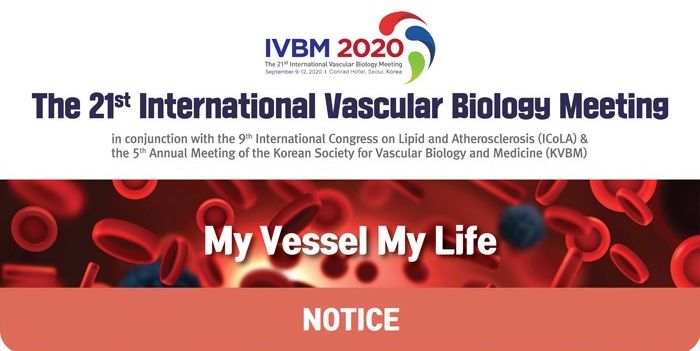
Following the outbreak of the COVID-19 pandemic, it was decided by the Organizing Committee that IVBM 2020 be hosted as a hybrid meeting, combining an online virtual component alongside the in-person meeting, while closely monitoring the COVID-19 situation. Now, as Seoul experiences a new wave of COVID-19 cases, the Korean government has raised the state of emergency to Level 2 out of 3 for all of Seoul as well as the neighboring provinces. Additionally, they announced that an increase to Level 3 would be considered under this recent spike in confirmed cases.
The Organizing Committee has therefore decided to make IVBM 2020 entirely virtual. The domestic participants of IVBM2020 will now join the meeting with all the international participants. Access to the virtual meeting will be open from September 9th to October 10th.
The Organizers hope that all the participants have a great experience despite this COVID-19 pandemic. They look forward to seeing you online!
|
September Webinar
 Our next webinar, September 17 at 1:00pmET, will feature Dr. Suneel Apte, of the Cleveland Clinic, and his presentation on Aggregating proteoglycans in the vascular wall - Implications for normal function, disease and phenotype modulation. Vascular wall composition and structure has an important role in vessel biomechanics at the tissue level and also in cell regulation. Proteoglycans, which are protein core + glycosaminoglycan composites, contribute vital structural properties to vessel extracellular matrix and have important regulatory roles vis-à-vis vascular cells. Proteoglycans that form aggregates with hyaluronan constitute a special class with unique attributes. The presentation will review their roles in vascular function and pathology illustrated by recent work for our laboratory.
September 24 Journal Club
This month's Journal Club will feature the paper: Single-cell analysis uncovers fibroblast heterogeneity and criteria for fibroblast and mural cell identification and discrimination. Nature Communications 07 Aug 2020. You can review the paper at https://www.nature.com/articles/s41467-020-17740-1#citeas. Lisandra Vila Ellis, MD Anderson Cancer Institute, a member of the NAVBO Education Committee, will give a 30-minute presentation followed by a 20-30 minute discussion. William Hughes, Medical College of Wisconsin, also of the Education Committee, will moderate the session. To register for this Journal Club, go to https://www.navbo.org/forum/09-20journal-club
|
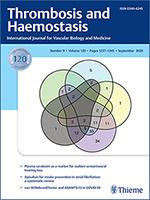
Thrombosis and Haemostasis
Thrombosis and Haemostasis provides a forum for the exchange of ideas and concepts fostering cross-disciplinary insights in basic and clinical research. The journal is published monthly in print and online via Thieme E-Journals.
It is covered in the main abstracting and indexing services and has an impact factor of 4.379.
|
Now Accepting Late-Breaking Abstracts
|
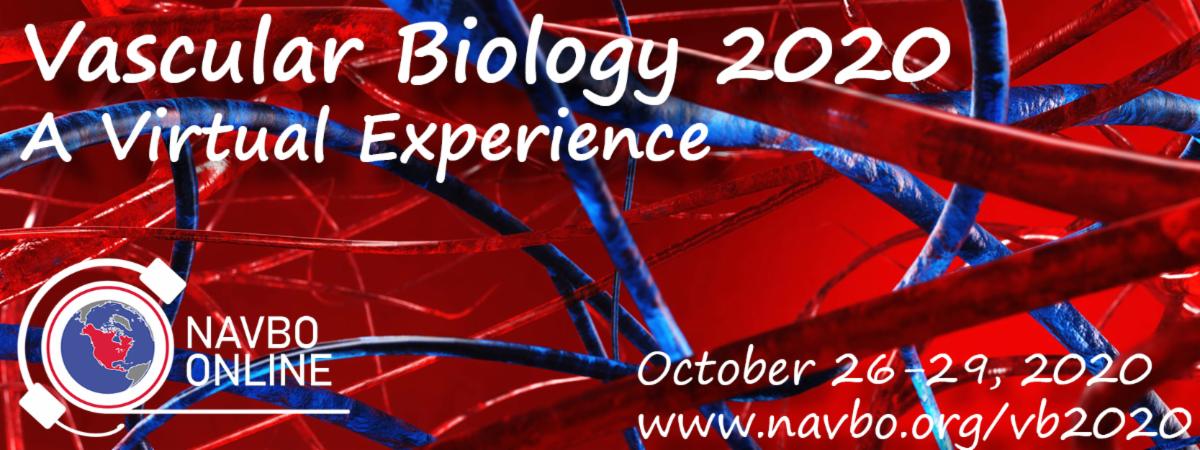
Very excited to be joined by: The Microcirculatory Society and the
American Society for Investigative Pathology
We're looking for volunteers! When you register indicate that you would like to judge posters and/or moderate a Round Table or Poster Discussion. Also, tell us what topics you want to discuss in our Round Tables.

Tweet this! Register for Vascular Biology 2020 |
|
Grant Opportunity in Lymphatics
|
Funding Opportunity for Lymphatic Malformations
The Lymphatic Malformation Institute and Lymphangiomatosis & Gorham's Disease Alliance are pleased to announce that the 2020 Million Dollar Bike Ride Pilot Grant Program is now open!
There is one $81,965 grant available for basic science and/or clinical research on generalized lymphatic anomaly (GLA), Gorham-Stout Disease (GSD), kaposiform lymphangiomatosis (KLA), and central conducting lymphatic anomaly (CCLA).
This Request for Applications (RFA) is open to the international community. All individuals holding a faculty-level appointment at an academic institution or a senior scientific position at a non-profit institution or foundation are eligible to respond to this RFA.
For more details about this grant program, please visit the ODC website.
Letters of Interest (LOIs) are due no later than Monday, September 18, 2020 by 8 pm EST.
|
|
Restructuring of Study Sections
|
NIH CSR begins implementation of ENQUIRE 2019 findings to modify study sections
Last year, the Center for Scientific Review at the NIH undertook Evaluating Panel Quality in Review (ENQUIRE 2019). This process aimed to ensure that study sections have the capacity to adapt their focus and priorities as their areas of science change. Over the past year, CSR ENQUIRE has integrated data and input from multiple stakeholders to determine whether changes in study section scope are needed to facilitate the identification of high impact science, with special consideration of emerging topics. Ten existing study sections of high interest to NAVBO members, clustered under the Cardiac, Vascular and Hematologic Sciences heading, have been reorganized into eight new groups, including Basic Biology of Blood, Heart and Vasculature (BBHV), Integrative Vascular Physiology and Pathology (IVPP), and Atherosclerosis and Vascular Inflammation (AVI). Reviews by the IVPP panel, which will consider applications focused on endothelial cells, blood vessels and lymphatics and their role in normal physiology and disease, will commence with the Oct 5, 2020, grant deadlines (Feb/March 2021 review meetings).
|
Bhama Ramkhelawon 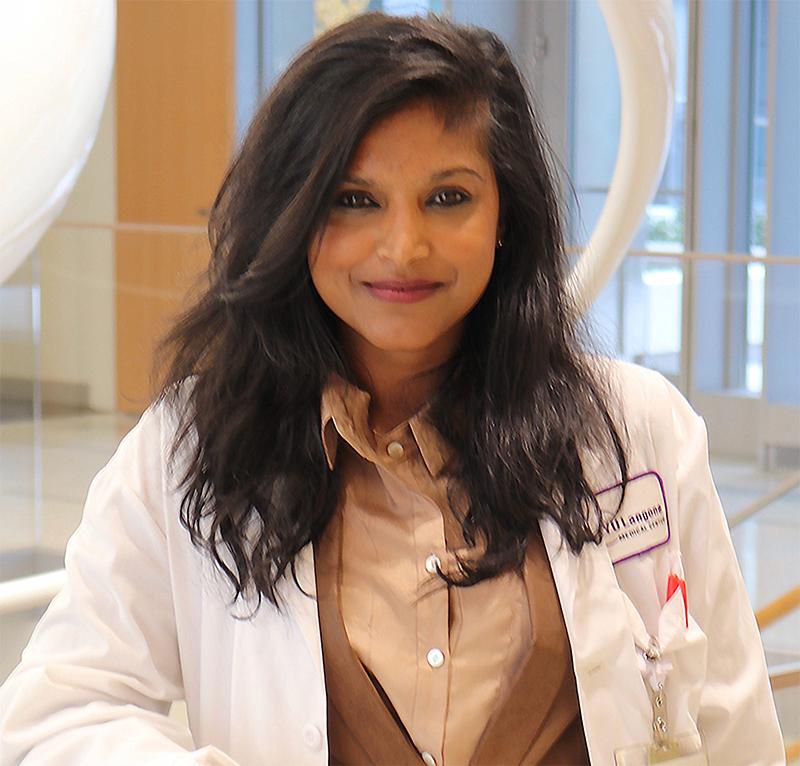
I am thankful to NAVBO for giving me the opportunity to share my experience with you in this column. I invite early career fellows to read theses sections from all the past contributors. They are REAL lessons learned.
I feel it is worth mentioning that I write these words in August 2020 during the unfortunate COVID-19 pandemic that struck us with a pounding weight and burdened us with many uncertainties for the future. There have been may lessons learned from this pandemic. Decisions were made based on observation and data collected during the initial wave of infections. As we gathered more evidence, we became more familiar with the mode of infection and contamination of the SARS-CoV-2 virus. We were then able to refine treatment of patients and make more informed decision to the general public.
This scenario will most likely portray the journey of a junior to a senior scientist. There will be many first times seasoned with complex choices, round-abouts, painful moments, rejections, but as hard as all these seem to be in the beginning, with careful observation, patience and resilience, you will eventually have "Veni, Vidi, Vici" as your motto.
My colleagues have all provided valuable insights into measures to adopt to trace a successful trajectory as an independent investigator. I would like to take this space to share new perspectives in this spectrum of initiatives that provide guidance and encourage opportunities. I emphasize on these specific points below:
"Professional personality" etiquette. As my colleagues have rightly depicted, networking is one of the important pieces of the puzzle in becoming a successful principal investigator. However, successful meet and greet seem to be facilitated for individuals with outgoing/extrovert personality traits. Personality becomes an important factor. We all evolve in a spectrum of characters-from the most introverts and shy to the exuberant extroverts. We have to recognize our personality and develop a "professional personality" if we fall more in the introvert zones. You will spend a lot of time asking, requesting and criticizing. To editors, collaborators, students, fellows, mentors. Develop this professional personality trait. Practice at asking and questioning. Practice at demonstrating excitement about your research. Practice in your daily routine exercises for example when you order coffee, try to ask for something additional or question how, where coffee is made. Watch and learn. Like what we did with COVID-19. When you leave the lab, you can drop the professional coat.
As human beings we tend to reciprocate previous situations and experiences. For those who unfortunately were unlucky and experienced bad mentorship during their training, we sometimes tend to reciprocate these in our lab. Take the opportunity to take a new direction and Recreate instead of reciprocating. We take the best from our past but we should also drop the worse. Make this become your professional trait.
Be organized. Organization is the holy grail of optimal time management. This might seem obvious for individuals with management training but just within a couple of years in your scientific leadership role, you will be faced with piles of information to collect- scientific results, dossiers on personnel, finance records, the tenth version of the manuscript or grant proposal... keeping track is important. We will forget and spend hours screening your emails for important information. Take good habit of recording and tracking everything properly and your team will follow.
Trust your results. In our work, we build on what others have discovered. But if we go back in time, these were first time discoveries for these scientists. Some of which you might consider groundbreaking and sometimes appear surprising to you. Details matter. Trust your results and don't be afraid if your findings seem a bit provocative. With the era of powerful new tools available for in-depth analysis, you might indeed expose new findings that will change the way scientists thought in your field. These are the most exciting moments. Keep exploring.
Be thankful. Express gratitude. Mentors will take time to advise, guide, provide feedback etc. It is important to be thankful not just out of courtesy but it also reflects on the importance of what they did for you. And you will take this time to give to others, your students and fellows. Be thankful to yourself, this journey is tough with many ups and downs. Celebrate the ups, fight the downs. Watch, learn and succeed.
You can view all of the Lessons Learned by visiting our web site. Go to
|
The Lab of Dr. Bhama Ramkhelawon
|
Funding opportunity to support undergraduate research
Cayman Biomedical Research Institute (CABRI), a nonprofit affiliate of specialty biochemical supplier Cayman Chemical that supports research on rare illnesses and orphan diseases, is soliciting applications from undergraduate students who have been offered an unpaid laboratory research position under an accredited principal investigator. CABRI's program is motivated by the recognition that research positions available to undergraduates typically are unpaid, limiting access to students who can afford to volunteer their time. Kirk Maxey, President and CEO of Cayman and President of CABRI, notes that the grants are "...intended to expand access to this opportunity for more individuals whose early research training will set them on a lifelong path of scientific discovery." Applications will be accepted until September 20, 2020, for awards to be distributed by November 2, 2020. Grants from CABRI will range from $2,000-5,000 and may be awarded as individual or group grants.
|
Welcome to our New Members:
Pinar Bayrak-Toydemir, ARUP Laboratories
Bal Chaube, Yale University
Ana Correia-Branco, Tufts Medical Center
Trey Gilpin, University of Wisconsin Madison
Kristofor Glinton, Northwestern University
Sara Gonzalez Anton, Imperial College
Rajat Gupta, Brigham and Women's Hospital
Martin Hsu, University of Wisconsin Madison
Prabhash Jha, Brigham and Womens Hospital
Maninder Kaur, NHLBI
Alamzeb Khan, Yale University
Shiori Kuraoka, Brigham and Women's Hospital, Harvard Medical School
Jinyu Li, Yale
Katharina Maisel, University of Maryland
Olivier Massot, Independent Researcher
Tung Nguyen, University of Illinois at Chicago College of Medicine
Weiming Ni, Yale University
Takehito Okui, Brigham and Women's Hospital, Harvard Medical School
Michelle Olive, National Institutes of Health
Neelam Raja, NIH
Sneha Raju, TGHRI
Hongtao Shen, University of Virginia
Troy Trevino, University of Illinois at Chicago
Jamaira Victorio, University of Campinas
Qingwei Wang, University of Virginia
Jiliang Zhou, Augusta University
|
 |
| Recent Publications by NAVBO Members |
Role of R-spondin 2 in arterial lymphangiogenesis and atherosclerosis
Cardiovascular Research
Background: Impaired lymphatic drainage of the arterial wall results in intimal lipid accumulation and atherosclerosis. However, the mechanisms regulating lymphangiogenesis in atherosclerotic arteries are not well understood. Read more
|
Artery to vein configuration of arteriovenous fistula improves hemodynamics to increase maturation and patency
Science Translational Medicine
Arteriovenous fistulae (AVF) are the preferred mode of hemodialysis access, but 60% of conventional [vein-to-artery (V-A)] AVF fail to mature, and only 50% remain patent at 1 year. Read more
|

Research!America's 2020 Health Research Forum approaches
Research! America, a collective advocating strong funding and policies that support the advancement of medical, health and scientific research, announces the 2020 Virtual National Health Research Forum, "Straight Talk: Securing a Science-Strong Future." For over two decades, the National Health Research Forum has gathered top federal officials, leadership from Research!America partners, and prominent media professionals to take a sober look at issues crucial to the wellbeing of our communities and all beneficiaries of life science research. Guest speakers include NIH Director Francis Collins, FDA Commissioner Stephen Hahn, CDC Director Robert Redfield, and NIAID Director Anthony Fauci. Interactive panel discussions on vaccine hesitancy and health disparities, as well as "flash talks" featuring young scientists from academia and industry and powerful personal stories from patient advocates, are planned. The event is free and open to the public.
Manuscripts sought on SARS CoV2 pathophysiology
American Journal of Physiology-Lung Cellular and Molecular Physiology has issued a call for papers on topics related to "The Pathophysiology of COVID-19 and SARS-CoV-2 Infection." Manuscripts are encouraged on development of suitable in vitro, ex vivo, and animal models of SARS CoV2 and other coronavirus infections. Additional topics of interest include identification of biomarkers to monitor physiological processes affected by SARS CoV2 infection, the pathophysiology relevant to viral replication in clinical disease or experimental models, and others. Question related to this call may be directed to AJP-Lung Editor-in-Chief Rory E. Morty or Physiological Reports Editor-in-Chief Dr. Thomas R. Kleyman. Deadline for submission is December 31, 2020.
Lingering cardiovascular consequences of COVID-19
Boston VA and Harvard Med Cardiologist Haider Warraich writes in the Aug 17, 2020, issue of the NY Times that myocarditis is emerging as a serious and frequent follow-on to SARS CoV2 infection, even in asymptomatic young patients without the common risk factors associated with severe pulmonary disease manifestations of COVID-19. Citing a recent German study published in JAMA Cardiology, Dr. Warraich comments on the alarming finding that nearly 80% of the 100 study participants had persistent abnormalities detected by MRI and 60% had evidence of myocarditis. Still unclear is how SARS-CoV-2 causes myocarditis: by causing injury directly or as a consequence of an aggressive host immune reaction.
|
|
Frontiers in Cardiovascular Medicine
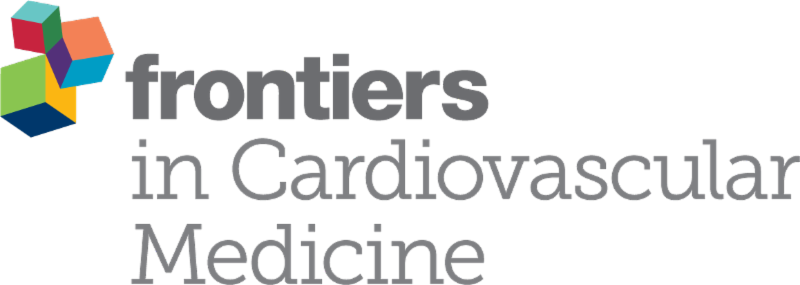 Special Research Topics Special Research Topics
Putting Engineering Back In Vascular Tissue Engineering To Advance Basic Science and Clinical Applications
Topic Editors: Jessica Wagenseil (Washington University in St. Louis) and W. Lee Murfee (University of Florida).
This topic is sponsored by NAVBO
Vascular tissue engineering (VTE) can be characterized as the creation of replacement vessels. Over the past 30 years, approaches have incorporated different combinations of extracellular matrix scaffolds, cells and biological active chemical cues. Challenged by the goal to recapitulate the complexity of big or small vessels, the clinical use of in vitro tissue engineered vessel replacements is still limited. With research more often focusing on reductionist materials science or cell biology characterization of vessel-like constructs, an opportunity has emerged to re-apply engineering approaches to guide the next step in VTE.
Submit your manuscript by October 17, 2020
What do we know about COVID-19 implications for cardiovascular disease?
The coronavirus epidemic causes major cardiovascular complications. Underlying mechanisms, however, remain incompletely understood. Frontiers in Cardiovascular Medicine invite you to submit your article on this topic. We consider all types of manuscripts: fundamental basic science reports, translational or clinical studies, review articles and methodology papers.
We have already published 17 articles. More submissions are currently under review. Due to the popularity and the emerging nature of this topic, we decided to extend the deadline to December 31, 2020. All articles submitted before this deadline will be published free of charge. We encourage you to take advantage of this opportunity to publish your original study or review article in FCVM (Impact Factor 3.915).
Comorbidities and aortic valve stenosis - molecular mechanism, risk factors and novel therapeutic options
Topic Editors: Claudia Goettsch, Felix Jansen and Cynthia St. Hilaire Aortic valve stenosis (AS) is the most prevalent valvular heart disease of the elderly population in the developed world, and the disease burden is estimated to increase from 2.5 million in 2000 to 4.5 million in 2030. Comorbidities like hypertension, type 2 diabetes mellitus, dyslipidemia, chronic kidney disease, COPD, chronic inflammatory diseases, and anemia are highly prevalent in this population. They not only influence the clinical course of AS and its prognosis, but affect therapeutic success. Submit your abstract by September 15, 2020 For more information, click here |
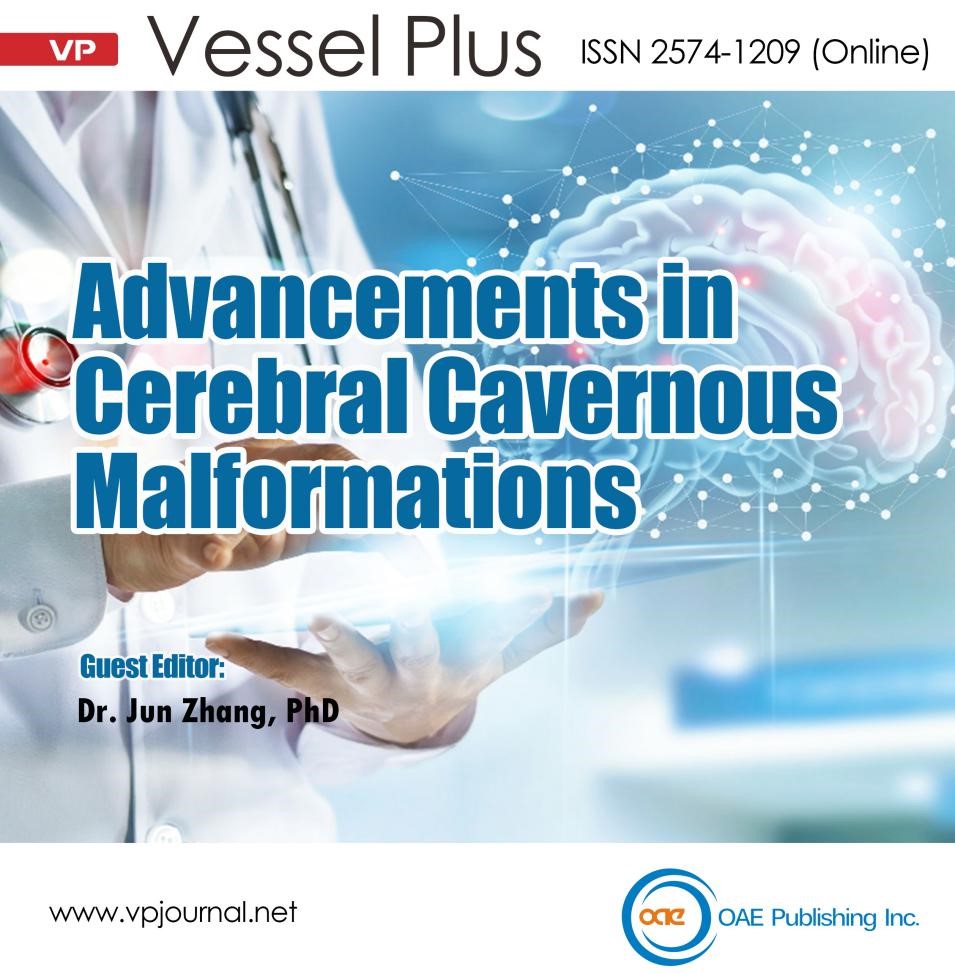
Dear friends and colleagues,
Jun Zhang, PhD (Associate Professor, Texas Tech University Health Sciences Center El Paso), is organizing a special issue entitled "Advancements in Cerebral Cavernous Malformations" in journal Vessel Plus (VP, ISSN 2574-1209).
This special issue aims to bring readers the up-to-date view of advancements in the scientific and technology innovations, translational and basic-science studies, and clinical trials of cerebral cavernous malformations. For more details about this special issue and the "Author Instructions", please visit the website at https://vpjournal.net/journal/special_detail/459.
Are you interested in contributing an article before February 15, 2021? If yes, please contact Jun Zhang (jun.zhang2000@gmail.com), the Guest Editor for this special issue, or Mavis Wei (mavis@vpjournal.net), the Managing Editor of VP. If you need additional information, please feel free to contact us.
VP is an online open access journal which was launched on March 31, 2017 by OAE Publishing Inc. It waives the Article Processing Charge (APC) for all publications since launched. Thus, your manuscripts will be published totally free of charge once officially accepted after quick and rigorous peer-review. Meanwhile, all manuscripts published in VP will be immediately available online for free downloading and reading. Further, if the work is funded by NIH, we can deposit it in PubMed on your behalf.
Thank you for considering this invitation.
|
Dear friends and colleagues,
This special issue aims to provide readers with an up-to-date advancement in lesser-known genes, proteins and signaling pathways in vascular biology. Manuscripts related to concepts from these genes and proteins and their associated signaling pathways that connect into the well-established vascular ligand-receptor signaling systems are welcome. For more details about this special issue and the "Author Instructions", please visit the website at https://vpjournal.net/journal/special_detail/478. Are you interested in contributing an article before December 31, 2020? If yes, please contact Ramani Ramchandran (rramchan@mcw.edu), the Guest Editor for this special issue, or Mavis Wei (mavis@vpjournal.net), the Managing Editor of VP. If you need additional information, please feel free to contact us. VP is an online open access journal which was launched on March 31, 2017 by OAE Publishing Inc. It waives the Article Processing Charge (APC) for all publications since launched. Thus, your manuscripts will be published totally free of charge once officially accepted after quick and rigorous peer-review. Meanwhile, all manuscripts published in VP will be immediately available online for free downloading and reading. Further, if the work is funded by NIH, we can deposit it in PubMed on your behalf. Thank you for considering this invitation.
|
|
|